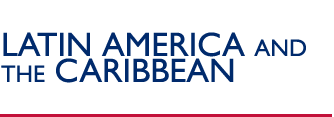Education in Latin America and the Caribbean
Overview
Despite recent advances, educational systems in the Latin
America and Caribbean region (LAC) continue to face serious
shortcomings. The overall quality of education is poor, and
LAC students consistently score near the bottom on international
test comparisons. The gap in literacy between LAC countries
and other regions of the world has widened in the last ten
years.
The inferior quality of education impedes the ability of
the region to move forward politically and economically. LAC
lags behind its competitors educationally: Young workers in
the region enter the labor force with fewer years of education
than do workers in countries of similar incomes in Asia and
the Middle East. Children in LAC countries attend school an
average of 5.4 years. In some countries, only ten percent
of students graduate from the sixth grade without repeating
a grade. Many drop out of school all together.
Indigenous, rural and poor urban students particularly suffer
from unequal access to quality education. The responsibility
for the high numbers of illiterate children lies partially
with the teachers. A good number have not finished secondary
school. Many are ill-prepared and have insufficient materials
and support in the classroom. High rates of students who have
to repeat a class drains already inadequate education investments.
Training and Support
USAID views education as of one the best development investments.
Improved educational quality is linked to strengthened human
capacity that supports development across all sectors, especially
improved health, more vibrant economic growth, and more democratic
governance.
USAID focuses its education activities in the LAC region
to:
- Upgrade teacher skills and improving the quality
of instruction
Through model school programs, such as Escuela Nueva, Escuela
Modelo, and AprenDes, USAID has created integrated approaches
that succeed in improving educational quality in the classroom.
- Increase community involvement in schools
USAID integrates community and parent participation through
many of its education programs. In Peru, the AprenDes program
encourages parents to improve school quality by “democratizing”
school governance.
- Improve resources provided by governments
for basic education needs
USAID strengthens policy analysis and dialogue skills
among government and private sector institutions, raising
the profile of education resources as an issue for public
debate. In Guatemala, for example, education funding was a
major issue during the 2003 general elections.
- Raise the quality of curricula and teaching
materials
USAID helps ministries of education revise and improve teaching
standards and curriculum, as well as teaching materials. In
Honduras, for example, USAID helps the government improve
standards and curriculum through Grade 6, drawing on relevant
international best practices.
- Provide disadvantaged students with the opportunity
of a high-quality education
Providing increased access to disadvantaged and poor students
is part of USAID’s strategy in the region. In Jamaica,
for example, the New Horizons program focuses on schools
where a large number of children are economically disadvantaged.
USAID LAC at Work
In addition to the country-based education programs,
the LAC Bureau implements a number of regional programs
that involve multiple missions and cross-regional learning
and exchange of the best ideas and practices. LAC’s
regional programs aim to improve the teaching of literacy
across the hemisphere and strengthen the policy dialogue
on education reform.
These programs include:
The Centers of Excellence for Teacher Training (CETT) is a Presidential Initiative that advocates literacy skills
as the foundation of all future learning. CETT attempts
to upgrade the skills of classroom teachers, especially
in reading and literacy in Grades 1, 2, and 3. CETT also
coordinates with teacher training institutions in LAC to
train highly skilled and motivated teachers who will give
their pupils a strong reading and writing foundation. Since
its inception in 2002, CETT has trained over 7,000 teachers
and helped an estimated 240,000 children in 15 countries.
Public and private sector partnerships are important elements
of CETT. Through partnerships with Scholastic Books and
Sesame Workshop, nearly 1,000 CETT classrooms will receive
classroom libraries and supplemental Spanish-language reading
materials. Significant financial and in-kind contributions
have been made by a wide-ranging group of companies that
include Air Jamaica, Alcoa Foundation, Antamina, BP Amoco,
Illuminat, Plus Patrol, and ProQuest.
The Partnership for Educational Revitalization in the
Americas (PREAL)
For the past decade, PREAL has helped to improve the quality
of education in the region by conducting quality research,
disseminating best practices, and monitoring national and
regional progress on improving education systems. PREAL’s
Education Report Cards have been very well-received. Notably,
the business sector in Panama paid all costs for the Panama
Report Card. In partnership with private sector foundations
in Colombia - Fundacion Empresarios, Fundacion Corona, and
Corpoeducacion - PREAL produced report cards in six Colombian
departments (states). Colombian organizations covered most
costs.
Civic Engagement for Education Reform (CERCA)
CERCA mobilizes broad constituencies to improve school accountability
and quality in five countries: the Dominican Republic, El
Salvador, Guatemala, Honduras, and Nicaragua. CERCA hopes
to create greater knowledge among public and private sector
constituencies on the importance of and strategies to empower
parents and communities to hold schools and policy makers
accountable for educational quality. To support this goal,
CERCA has reviewed different models to enhance educational
accountability in five Central American countries and also
developed school level report cards.
Back to Top ^ |


